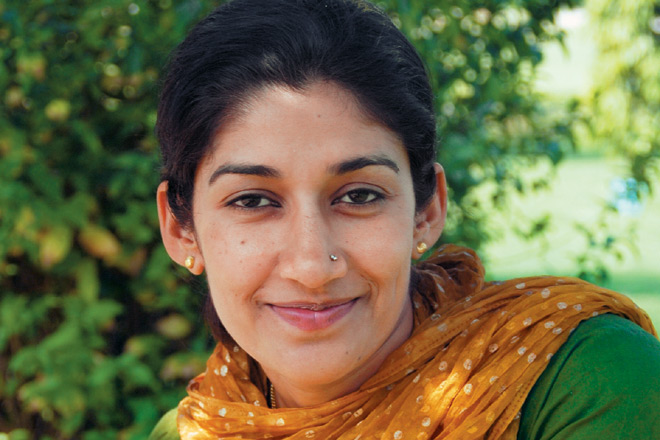OT: What is a typical day in your life like? Ratna Singh: Whether
In summer, we pick up the guests by 4.45am and then we’re off to the jungle. We return by 10.30/11am, have a longish siesta, and head out again to the jungle by 3pm, to be back by 7pm for cocktails. I change into my khakhis before going behind the bar and mixing drinks — naturalists are also trained in hosting and by mixologists. Then dinner, and we’re in bed by around 11pm.
OT: What happens when you’re out in the wild? You drive out, and…
Ratna Singh: Start looking for tigers! To be honest, there is not a single naturalist who, when stepping into the forest, will say, “I am not looking for a tiger.” We’re always looking for tigers. While I try to make sure that the guests’ experience in the wild is a well-rounded one, most guests only want to see tigers. Tigers are territorial, so we always go to the known tiger territories. You can pretty much predict that you’ll see a tiger if you’ve seen tracks, or there have been alarm calls from a section of the forest. Come summer, most of the smaller water holes dry up. So I head for the bigger water holes because I know that’s where the game will be — especially after sundown. And, unfortunately, we’re not allowed in the park after sundown. So we conduct walks in the lodge’s grounds, which can be around 50–200 acres. Thankfully, animals don’t know a core zone from a buffer zone, so they move around freely and come into the lodge grounds fairly often.
OT: How do locals and guests react to you?
Ratna Singh: In 2006, when I had just started working as a naturalist, people would run out of their homes to look at me. Even the forest staff would gawp. In 2007–8, when elephant safaris were still being conducted, I was helping guests onto the elephant, and people were ignoring the tiger, and taking pictures of me! Another time, I was drivÂing back to the lodge and offered a lift to some women who were walking back to one of the vilÂlages near the lodge. The whole time the women kept their heads covered, because they thought I was a man — I was wearing a hat and trousers. When I asked them where they wanted me to stop, they heard my voice and were shocked that I was a woman. Now they’re used to me.
OT: Tell us about the gender dynamic in your industry.
Ratna Singh: At first, people some people were patronising. They didn’t think I had it in me to stick around. However, jungles and rural areas are where I’m most comfortable. So this was home ground for me — that comfort helped me keep focus. Besides, I wasn’t doing anything to prove a point. I was there because I loved being there.
It took a while to be treated like a professional at par with the men. There was this guide who had no faith in my driving, and Bandhavgarh has some tricky terrain. The whole time that we were going over a particularly treacherous track — he had one leg dangling outside the door! I actually struggled with my emotions, not knowing whether to laugh or be annoyed. But in a couple of years or so, I was one of the guys. In any case most people call me ‘sir’, because rural folk haven’t really seen a woman in a position of power. I’m not really complaining.
OT: You spend most of your time out in the wild; does it affect your family life?
Ratna Singh: Fortunately, both my husband and I are avid wildlife lovers. We work in the jungles, and holiday in the jungles. Besides, we have a bit of a competition going on — he’s heavily into birding and we both keep lists of the birds we’ve sighted — always tryÂing to outdo each other.
OT: Any tips for other women looking to get into your line of work?
Ratna Singh: Well, it sounds like a cliché, but in a job like this, loving what you do is of utmost important. It’s not only a career, but a lifestyle. And unlike a city job, you don’t leave it and go home in the evening to have other interests. One has to be comfortÂable in one’s own company and have above-average levels of physical fitness.
OT: Tell us about your childhood and how you got into this line of work.
Ratna Singh: My home is a couple of hours of drive from Bandhavgarh national park, and the village was surrounded by rather thick forests. I have seen all sorts of animals, including tigers in my backyard! I went away to boarding school when i was very young, and longed to go back home. So this line of work was but the natural choice. After all, the wilderness is my home!
Leave a Reply
You must be logged in to post a comment.


